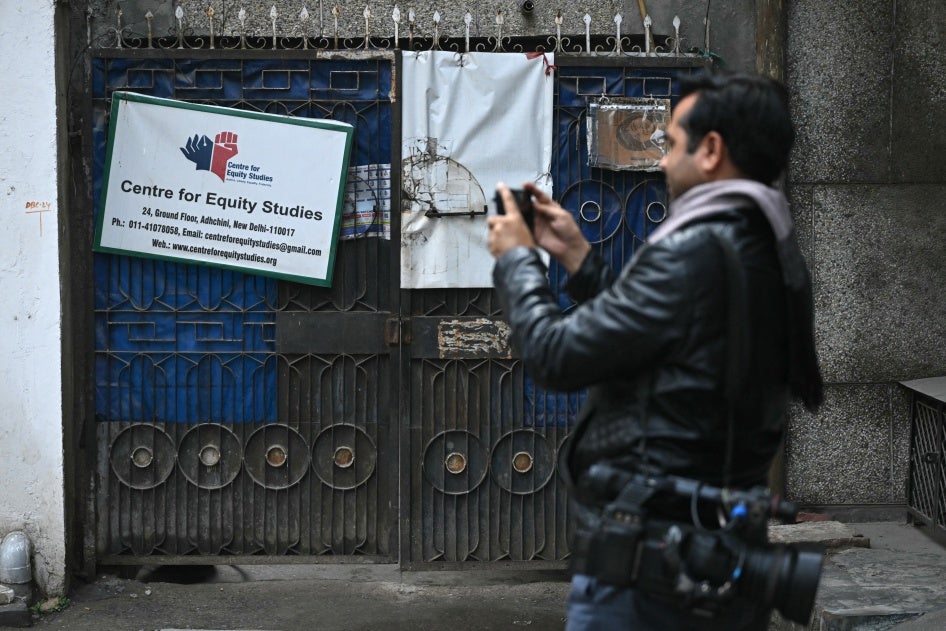(New York) – India’s Bharatiya Janata Party (BJP)-led government is using abusive foreign funding laws, trumped-up financial investigations, and other means to unlawfully attack civil society groups, Human Rights Watch said today. The arbitrary use of the Foreign Contribution Regulation Act (FCRA) against nonprofit organizations and the politically motivated targeting of peaceful critics undermine Indian government claims of being a rights-respecting democracy.
On February 2, 2024, India’s national investigation agency, the Central Bureau of Investigation (CBI), raided the home and offices of Harsh Mander, a prominent human rights activist, and filed a police investigation. In January, the authorities ordered X, formerly known as Twitter, to block Hindutva Watch, a project that documents crimes against minorities in India. The authorities have also blocked access to the website of India Hate Lab, which tracks instances of hate speech.
“India’s efforts to muzzle activist groups just highlight the extent to which the government is violating basic rights,” said Meenakshi Ganguly, deputy Asia director at Human Rights Watch. “Foreign governments concerned with India’s assault on civil society should be speaking out, not waiting for the situation to deteriorate further.”
Mander recently led a peace march in Manipur, where a communal conflict has claimed over 200 lives. The authorities raided his home after a Home Ministry official filed a complaint alleging financial irregularities under FCRA by the Centre of Equity Studies, a research organization that Mander heads. The complaint also links other nonprofit organizations to the alleged misconduct, including Aman Biradari Trust, Oxfam India, and Action Aid Association.
Over 250 scholars, activists, and civil society members condemned the raid against Mander, terming it a “vindictive witch hunt.” Mander told Human Rights Watch: “I have been determined from the start of these attacks – and they have been going on for years – that I will not let anything that the state does to me silence my conscience or my voice or crush my work.”
In June 2023, Indian authorities had temporarily suspended the FCRA license of the Centre for Equity Studies because Mander had allegedly violated the law by becoming a frequent columnist for various national newspapers and independent publications.
Since 2016, the authorities have routinely revoked or suspended licenses, and have accused nonprofit organizations of evading the law, freezing their bank accounts. Human rights groups fear this is one way for the government to gain control over organizations. As of February 6, the Home Ministry had cancelled 20,697 FCRA licenses, according to official data. Among those denied funding are numerous groups that have long promoted human rights and democracy.
On February 3, the Tamil Nadu Social Service Society, a Christian charity, lost its FCRA license for alleged violations that remain unclear. In January, the Centre for Policy Research (CPR) lost its license after the authorities claimed that the research institution diverted foreign donations to allegedly fund “protests and legal battles against developmental projects” to “affect India’s economic interests.” In a statement, CPR denied the allegations and called the move “incomprehensible and disproportionate.”
The authorities also cancelled the license of World Vision India, a Christian charity that has functioned in the country for over 60 years, primarily focusing on humanitarian support to children in poor communities. In a statement, World Vision said it was “profoundly disappointed,” and that the decision will only cause harm to “many vulnerable people across the country in the coming years.”
Hindutva Watch and India Hate Lab are no longer accessible in the country for allegedly violating the Information Technology Act 2000. Journalists and online critics are increasingly at risk of prosecution under this law and the IT Rules of 2021 for content critical of the authorities. The founder of both projects, Raqib Hameed Naik, told Human Rights Watch that the decision is “extremely alarming and points to casting a wide net of censorship against groups documenting and studying hate crimes, hate speech, and disinformation,” and that it “directly infringes upon the fundamental right of every citizen to access information.”
The BJP government, which promotes a Hindu majoritarian ideology, has failed to protect religious minorities and instead adopted policies that infringe on their rights, and has previously cracked down on documentation of such abuses. The US Commission on International Religious Freedom has recently issued several statements and reports about India’s worsening attacks on religious minorities, and a February 7 report by Amnesty International outlines extensive use of targeted demolitions of Muslim properties across India as a form of extra-judicial punishment.
“Indian authorities should act swiftly to protect religious minorities and prosecute all those, including government supporters, who incite or engage in violent attacks,” Ganguly said. “International partnerships with other democracies should encourage India to course correct on human rights to keep a bad situation from getting worse.”








